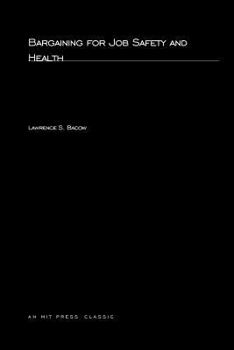Bargaining For Job Safety and Health
Select Format
Select Condition 
Book Overview
Assessing the role of government regulation in occupational safety issues. In 1977, a grain elevator explosion in Westwego, Louisiana, took the lives of thirty-five workers. The next year, fifty-one men who were working on cooling tower for a West Viginia power plant died when their support scaffolding collapsed. And more recently, a Senate subcommittee hearing revealed that the incidence of lung cancer among uranium miners is nearly four times the national average rate for men of the same age. Clearly, as Lawrence Bacow writes in this book, occupational safety and health is a big problem that may be getting bigger.What can be done about it? This book argues that OSHA is not up to the task. Most accidents are caused by hazards that are unique to individual firms. A single regulatory authority like OSHA cannot be everywhere at once; it lacks the resources needed to ferret out firm-specific hazards and to ensure day-to-day compliance with health and safety regulations. If government is to make the workplace safe, it must enlist the help of the parties that have the greatest influence over safety and health on the job--labor and management.Bargaining for Job Safety and Health examines how labor and management work together and against each other to abate occupational hazards. It describes OSHA's influence, both positive and negative, over collective bargaining on health and safety issues. Through a series of case studies in develops a theory to explain why some unions are more aggressive than others in pursuing health and safety objectives. The book also outlines strategies that OSHA might take to encourage labor and management to assume a larger role in curbing job hazards through collective bargaining. Although it focuses on job safety and health, this book draws a number of very interesting parallels between OSHA and other types of regulatory programs. It should interest a wide audience, including labor and management officials, health and safety professionals, policymakers, labor relations scholars, and others interested in regulatory reform and program design.
Format:Paperback
Language:English
ISBN:0262520796
ISBN13:9780262520799
Release Date:September 1982
Publisher:MIT Press
Length:170 Pages
Weight:0.55 lbs.
Dimensions:0.5" x 5.9" x 8.9"
Age Range:18 years and up
Grade Range:Postsecondary and higher
Customer Reviews
0 rating





